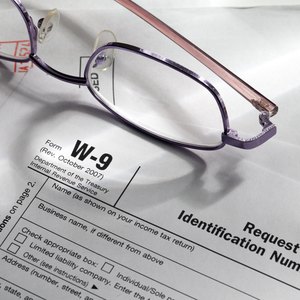
A W-9, Request for Taxpayer Identification Number and Certification, is often requested by banks to verify your identity. Generally, it's a simple way for the bank to verify your Social Security number and citizenship. For some banks, the form is required whenever you open a new account, even if it's a noninterest-bearing account.
Tips
One of the primary reasons a bank requests your W-9 form when establishing a non-interest account is to obtain your Taxpayer Identification Number, also known as a TIN.
How Banks Use Your W-9
Banks that pay you interest income must file a
Completing a W-9
The W-9 form requires you to provide your full name and Social Security number. If you're opening an account for your business, use the legal business name and Employer Identification Number to complete the W-9. You'll need to write your full address and account number. Sign the form to certify your Tax Identification number is correct and valid, that you're a U.S. citizen and whether or not you're subject to a backup withholding.
Substitute W-9 Form
Some states have bank accountholders complete a Substitute W-9 Form. Although it's called a substitute form, it gathers the same information. It's actually the state's version of the W-9 form used to gather your Social Security number or Employer Identification Number. Instead of submitting the form to the IRS, the bank sends it to the state's tax department. For example, in Virginia, the form is submitted to the Commonwealth Vendor Group.
Taxes on Investment Income
Most individuals are exempt from backup withholding taxes on investment earnings. However, the IRS can require the bank to withhold up to 24 percent of your interest income if you fail to provide your Taxpayer Identification Number or provide an invalid one. If you fail to report the interest income you earned in a given tax year, you may then also find that taxes are held out on your earnings.
References
Writer Bio
Jeannine Mancini, a Florida native, has been writing business and personal finance articles since 2003. Her articles have been published in the Florida Today and Orlando Sentinel. She earned a Bachelor of Science in Interdisciplinary Studies from the University of Central Florida.

